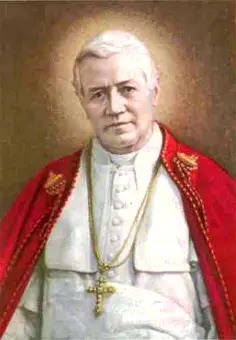
Following the Good Shepherd: Saint Pius X and Pastoral Leadership
Today we celebrate the feast of Saint Pius X, known as the "Pastor of Pastors." Born Giuseppe Sarto in 1835, he rose from humble beginnings to become Pope, yet never forgot his calling to shepherd souls with the heart of Christ. His life teaches us what true pastoral leadership looks like in practice.
Let us hear Christ's own words about shepherding from John 10:11-16: "I am the good shepherd. The good shepherd lays down his life for the sheep. He who is a hired hand and not a shepherd, who does not own the sheep, sees the wolf coming and leaves the sheep and flees, and the wolf snatches them and scatters them. He flees because he is a hired hand and cares nothing for the sheep. I am the good shepherd. I know my own and my own know me, just as the Father knows me and I know the Father; and I lay down my life for the sheep. And I have other sheep that are not of this fold. I must bring them also, and they will listen to my voice. So there will be one flock, one shepherd."
Saint Pius X embodied these words, showing us that pastoral leadership flows from Christ's own heart for His people.
Despite holding the highest office in the Church, Saint Pius X remained remarkably accessible to ordinary people. He opened the Vatican doors to the poor and simple, often saying, "I was born poor, I lived poor, and I want to die poor." He would personally receive visitors, blessing children and comforting the suffering.
This teaches us that true pastoral leadership begins with humility. Whether we're parents, teachers, or parish leaders, we must remember that authority is given for service, not status. Like Christ who "came not to be served but to serve," we lead best when we remain close to those we're called to shepherd.
Saint Pius X's greatest pastoral reform centered on the Eucharist.
He lowered the age for First Holy Communion to seven years old and encouraged frequent, even daily reception of the Eucharist. His motto was "Restore all things in Christ," and he knew this restoration happened primarily through the Mass.
He understood that good shepherds must feed their flocks. Just as Christ multiplied loaves and fishes, pastoral leaders today must ensure spiritual nourishment reaches everyone. This means making the Word of God accessible, creating opportunities for prayer and worship, and helping others encounter Christ in the sacraments. We feed others not just with food for the body, but with the Bread of Life.
Saint Pius X also protected the Church through necessary reforms. He reorganized Church law, reformed seminary education, and defended Catholic doctrine against modernist errors. Like a shepherd protecting sheep from wolves, he safeguarded the faith while strengthening Catholic identity.
True pastoral care sometimes requires difficult decisions.
Parents must set boundaries, teachers must correct errors, and Church leaders must defend truth. Protection isn't always popular, but it flows from love. When we see others heading toward spiritual danger, pastoral leadership calls us to intervene with both courage and compassion.
We don't all need to be popes to exercise pastoral leadership. Parents shepherd their families, teachers guide their students, and parishioners care for neighbors. Saint Pius X shows us that pastoral leadership means: serving with humility, nourishing others spiritually, and protecting those in our care.
Ask yourself today: How can I shepherd others in my sphere of influence? Perhaps it's mentoring a young person, visiting someone who's lonely, or simply listening with Christ's compassion. Remember, the Good Shepherd knows each sheep by name – and He calls us to know and care for those He places in our path.- F.D.

